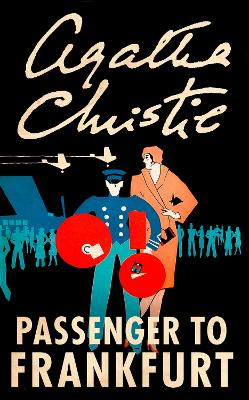Reviewed by brokentune on
The thing is, I actually enjoyed the first half of the book.....then it became more and more convoluted and bizarre.
Ok, a bit more detail: I could follow the plot up to about the half-way mark and had even made peace with the plot basically being about a resurgence of Nazi-Germany, orchestrated by some weird Countess and thwarted by some English gentleman, his girlfriend, and his auntie (who incidentally was at school with the Countess).
As a plot it was way out there, like a deliberately bad space opera,......and it was only the ridiculousness of the whole thing that made it bearable.
But it didn't stop there (or anywhere, really), on top of the plot we also get what I think was Christie's re-imagination of Charles de Gaulle - as the Marshal ??? - but being somewhat deranged and hell-bent on declaring war on all youths, because they are the root of the evil that seems to have befallen the world (seriously, in the context of the plot this is supposed to make some sense - because young people are incapable of individual thought?).
"‘Riot must be put down. Rebellion! Insurrection! The danger to men, women and children, to property. I go forth now to quell the insurrection, to speak to them as their father, their leader. These students, these criminals even, they are my children. They are the youth of France. I go to speak to them of that. They shall listen to me, governments will be revised, their studies can be resumed under their own auspices. Their grants have been insufficient, their lives have been deprived of beauty, of leadership. I come to promise all this. I speak in my own name. I shall speak also in your name, the name of the Government, you have done your best, you have acted as well as you know how. But it needs higher leadership. It needs my leadership. I go now. I have lists of further coded wires to be sent. Such nuclear deterrents as can be used in unfrequented spots can be put into action in such a modified form that though they may bring terror to the mob, we ourselves shall know that there is no real danger in them. I have thought out everything. My plan will go."
We also get some science, well pseudo-science, about drugs and mind-control. In particular, drugs that make people benevolent, but may also lobotomise them.
Seriously, tho, where I lost it was with the seemingly endless political theorizing between the parts that actually moved the plot forward. So boring, so weird, so making me forget what point we were at in the story.
Having finished, my verdict is that this truly is a terrible book, not just a terrible Christie book, but a pretty poor work of writing altogether. However, it is worth reading it to see that towards the end of her career, Christie really did lose touch with the world and her readers. The only question is whether this was a result of some sort of dementia or whether there was another reason.
Reading updates
- Started reading
- 3 July, 2016: Finished reading
- 3 July, 2016: Reviewed
